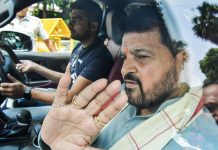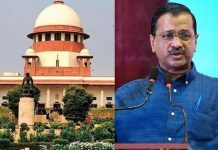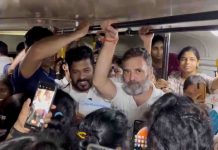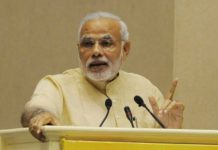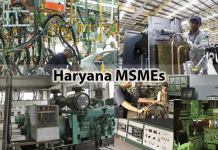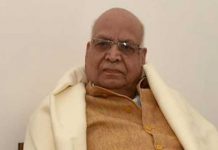The prediction of the third wave raises concerns among the policymakers and masses alike, reports AMIT AGNIHOTRI

Misplaced priorities of the Centre became a talking point as the devastating second wave of the Coronavirus crippled the country’s healthcare system and killed thousands of people.
Large number of infected patients, no beds with hospitals and no medical oxygen contributed to high number of deaths across cities where long queues of dead bodies outside crematoriums, shortage of wood for funeral pyres, and even parks and parking lots getting converted into makeshift cremation grounds, presented a sorry state of affairs.
Experts feared the actual number of infected cases and deaths could be much higher than the official records even as India, the world largest vaccine manufacturer, was found struggling to arrange sufficient doses to curb the deadly second wave of Covid-19.
As the nation was trying to come to terms with the pain, the prediction of experts that the third wave of the killer virus was inevitable, sent alarm waves across the country. Taking note of government’s Principal Scientific Adviser K Vijay Raghavan’s views that the third wave of Covid-19, whose timing was not known but which would affect children especially in the age group of 12-15 years, the Supreme Court asked the Centre to vaccinate all children before the problem arose.
However, it was unclear by when a vaccine for children would be available. The spread of Covid-19 from cities to rural India was another disturbing trend which worried the experts given large populations reside in villages which continue to suffer from poor healthcare facilities.
Over 40 dead bodies found floating in rivers Yamuna and Ganga near Buxar in Bihar stoked fears that people were throwing the deceased in water for want of cremation space. The opposition slammed the government for mismanaging the health crisis and pursuing the 20,000 cr Central Vista project, which includes a new house for the Prime Minister, at a time when the states were struggling with finances to vaccinate their populations.
Both Congress chief Sonia Gandhi and West Bengal Chief Minister Mamata Banerjee questioned the 35,000 cr that the Centre had allocated for the Covid-19 vaccination programme in the Union Budget 2021-22. “It is heartbreaking to see people battling for their lives in hospitals, on roads, waiting in vehicles, far too many for want of any medical help at all. Let us be absolutely clear-the system hasn’t failed. The Modi government has been unable to constructively channelize India’s many strengths and resources. I say this categorically- India is crippled by a political leadership today that has no empathy for the people. The Modi government has failed the people of our country,” Sonia told party’s lawmakers during an online interaction.
“The government failed to place sufficient orders for vaccines in time to meet the needs of our people. Instead, it consciously chose to allocate thousands of crores for non-essential projects that have nothing to do with the people’s well-being,” said Sonia whose appeal for an all-party meet to discuss a national response to the pandemic was ignored by the Centre. “Why are they not allotting 30,000 crores for vaccines when they are making new Parliament and statues, spending 20,000 cr. Where is the PM CARES Fund?” asked Banerjee.
The differential pricing of the two vaccines- Covishield from Serum Institute of India and Covaxin from Bharat Biotech- was another issue the opposition used to slam the Centre which was getting the vaccines at 150 per dose while the states paid 400 per dose.
The West Bengal government approached the top court to scrap the new differential pricing of the vaccines during the third phase of vaccination. The problem was that till April, the Centre used to buy the vaccines from SII and Bharat Biotech and distribute it to the states for free. Later, the policy was revised and the manufacturers were allowed to supply 50 percent of total manufactured vaccines to the states and private entities for the third phase of vaccination under which persons aged between 18-44 years would be covered from May 1.
In an affidavit filed before the apex court, the West Bengal government said the states cannot be made to negotiate and bargain individually on vaccine prices. The states will be compelled to allocate funds for vaccines which will have a crippling effect on their already stretched healthcare infrastructure, the West Bengal government argued.
Both Banerjee and Leader of the Opposition in the Rajya Sabha Mallikarjun Kharge demanded tax on vaccines and oxygen concentrators be waived but finance minister Nirmala Sitharaman defended the move saying it allowed the companies to claim rebate later otherwise they would pass on the cost to the consumer.
As its vaccine policy came under the Supreme Court scrutiny, a miffed Centre told the apex court not to interfere in the matter. “In the context of a global pandemic, where response and strategy of the nation is completely driven by expert medical and scientific opinion, there is little room for judicial interference. Any overzealous, though well-meaning, judicial intervention may lead to unforeseen and unintended consequences… in absence of any expert advice or administrative experience, leaving doctors, scientists, experts and executive very little room to find innovative solutions on the go,” the Centre said.
“Pricing of vaccines is not only reasonable but uniform across the country (after) government persuasion with two vaccine companies,” the Centre said. While the Centre struggled to deal with the situation, the experts kept debating whether it was the mutant UK strain of Coronavirus which was wreaking havoc in the country or the Indian double-mutant strain.
The only thing the experts could agree upon was that Covid-19 was here to stay and new strains of the virus would continue to threaten the world over the coming years.
In this background, the only way to safeguard the population was to vaccinate all of the people but the country was still facing vaccine shortage. The Centre claimed to have vaccinated 16 crore people so far but this was still low in percentage terms given India’s 130 cr population. If the rate of vaccination wasn’t speeded up, covering the entire population would take several years, the experts warned.
Even CoWIN, the new portal to register and schedule vaccination of those between 18-44 years faced technical glitches even as centers meant to vaccinate persons over 45 years faced shortage of doses.
To further add to the confusion, SII managing director Adar Poonawalla, flew off to London and decided to produce his vaccine there saying he was getting threats in India.
Poonawalla left the country days after the Centre extended Y-level security cover to him. Later he gave an interview to The Times, London saying that he was getting threats from most powerful persons to supply vaccines and those who called included chief ministers and business leaders.
“Threat is an understatement. The level of expectation and aggression is really unprecedented. It’s overwhelming. Everyone feels they should get the vaccine. They can’t understand why anyone else should get it before them,” Poonawalla said, adding, “They are saying if you don’t give us the vaccine it’s not going to be good. It’s not foul language, it’s the tone. It’s the implication of what they might do if I don’t comply. It’s coming over and basically surrounding the place and not letting us do anything unless we give in to their demands.”
Interestingly, stung by widespread criticism over its handling of the pandemic in the international media, which exposed an inefficient system, the Centre claimed that the situation was under control and organized workshops for its bureaucrats to project a positive image of the government.
There had been other examples of misplaced priorities as well. The government ignored demands to cancel the Kumbh Mela in Uttarakhand’s Haridwar, where around 70 lakh people gathered, during the pandemic. Later, the PM had to appeal to the devotees to keep the Mela symbolic.

Experts said the Kumbh Mela could turn out to be a super spreader event for Covid-19 just as the massive poll rallies in West Bengal could. The government also went ahead with the Uttar Pradesh local body polls despite several appeals in the High Court to defer them and backed the Election Commission’s plan to conduct the West Bengal assembly polls over eight phases even when the state government had opposed the move.
The government continued to highlight the number of cases recovered even as the number of deaths per day increased. But patients continued to die because of shortage of medical oxygen while the Centre kept saying there was no shortage of the gas, only distribution bottlenecks.
Miffed over repeated charges and countercharges between the Centre and the Delhi government, the apex court asked the Centre to ensure 700 MT oxygen per day to Delhi at any cost.
Later, the top court set up a National Task Force comprising known doctors to monitor and regulate the supply of oxygen nationwide, indicating the Union health ministry was not able to do the job effectively despite instructions.
During the hearing, Justice DY Chandrachud and Justice MR Shah emphasised the need for a speedy vaccination process and suggested forming a committee of experts for an oxygen audit while noting that the Centre’s oxygen formula required complete revamp.
Elaborating on the third wave, the top court observed that when a child goes to the hospital, the mother and father will also have to go. “That is why vaccination will have to be over for this group of people. We need to plan for this in a scientific way and thus make an arrangement,” it said.
The judges urged the government to explore the possibility of utilising the services of doctors who have completed MBBS and were waiting to enroll for PG courses.
After the matter of oxygen supply for Delhi was resolved, Chief Minister Arvind Kejriwal promised that all residents of the city would be vaccinated over the next three months for free provided the state government received around 85 lakh doses per month from SII.
Former Congress chief Rahul Gandhi too slammed the government over the Central Vista project. “Central Vista is criminal wastage. Put people’s lives at the center- not your blind arrogance to get a new house,” he said.
The Congress leader urged the Centre to, “Scientifically track the virus and its mutations across the country using genome sequencing as well as its disease patterns. Dynamically assess the efficacy of all vaccines against all new mutations as they are identified. Rapidly vaccinate our entire population. Be transparent and keep the rest of the world informed about our findings.”
Rahul’s criticism riled Union minister for housing and urban affairs Hardeep Singh Puri who hit back saying the opposition party had supported the Central Vista idea when it was in power.
“Congress’s discourse on Central Vista is bizarre. Cost of Central Vista is about 20,000 cr over several years. GoI has allocated nearly twice that amount for vaccination! India’s healthcare budget for just this year was over 3 lakh crore. We know our priorities,” Puri tweeted.
Besides the new Parliament building, the redevelopment of the Central Vista the nation’s power corridor envisages a common central secretariat, revamping of the 3 km long Rajpath from Rashtrapati Bhavan to India Gate, new Prime Minister’s Residence and Prime Minister’s Office, and a new Vice-President Enclave. The matter had gone to the top court which ruled in January in favour of the project though with some riders.
“Congress doesn’t stop at hypocrisy. Look at their shameful double face. During UPA, Congress leaders wrote about the need for a new parliament. The Speaker in 2012 wrote a letter to the Urban Development Ministry for the same. And now they have the gall to oppose the same project?” he said.
Puri pointed out the Congress and its allies were constructing an MLA hostel in Maharashtra and building a new Legislative Assembly building in Chhattisgarh, adding that “If this is fine, what is the problem with Central Vista?”
But Congress leader Jairam Ramesh reminded the Centre that it was treating the Central Vista as an essential service when the country was reeling from shortage of oxygen.
EXPERTS CAUTION
The Lancet, a globally respected health journal, criticized the Centre saying the success of India in overcoming the crisis will depend on PM Modi’s administration “owning up to its mistakes”. “(PM) Modi’s actions in attempting to stifle criticism and open discussion during the crisis are inexcusable,” it said.
“India squandered its early successes in controlling Covid-19. Until April, the government’s Covid-19 taskforce had not met in months. The consequences of that decision are clear before us, and India must now restructure its response while the crisis rages,” the Lancet editorial said.
“The success of that effort will depend on the government owning up to its mistakes, providing responsible leadership and transparency, and implementing a public health response that has science at its heart,” it said.
According to the medical journal, the Centre was giving out an impression that the country had defeated Covid-19 after several months of low cases, though the experts had been warning about a second wave of the pandemic caused by new strains.
“Before the second wave of cases of Covid-19 began to mount in early March, Indian Minister of Health Harsh Vardhan declared that India was in the “endgame” of the epidemic,” it noted.
“Despite warnings about the risks of super-spreader events, the government allowed religious festivals to go ahead, drawing millions of people from around the country, along with huge political rallies-conspicuous for their lack of Covid-19 mitigation measures,” Lancet said.
Expressing concern over the vaccination policy, the journal noted that the Centre did not discuss a change in policy with states. “At times, the government seemed more intent on removing criticism on Twitter than trying to control the pandemic,” Lancet said.
“The Institute for Health Metrics and Evaluation estimates that India will see a staggering 1 million deaths from Covid-19 by August 1. If that outcome were to happen, government would be responsible for presiding over a self-inflicted national catastrophe,” it added.
The Indian Medical Association, the largest body of doctors in the country, too questioned the Centre’s handling of the pandemic and described the approach as “extremely lethargic”.
The IMA said that the government did not pay heed to the advisories and suggestions issued by health professionals and took decisions without realising the ground realities.
Citing instances of many experts requesting the government to impose a nationwide lockdown, the IMA said that the central government’s refusal to impose lockdown has led to over 4 lakh daily Covid-19 cases in the country.
The IMA further said that despite PM’s announcement of phase 3 vaccination from May 1, the health ministry failed to draw a roadmap and arrange stock which contributed to the drive getting suspended across several centers in the country.
Taking a dig at differential pricing of vaccines, the medical association cited the past vaccination drives against smallpox and polio when the country could ensure free vaccination for all Private hospitals were facing shortage of medical oxygen not because of production problems but due to faulty distribution management, the IMA said.
The association questioned the official data on the number of new cases and deaths and wondered why the government was hiding actual Covid-19 statistics. Citing an example of false RT-PCR negative tests, the IMA said that authorities were not adding cases being traced through CT-scan reports.
World Health Organisation scientist Soumya Swaminathan also cautioned India that B.1.617 variant of Covid-19, a rapidly spreading strain, was behind the latest surge. Swaminathan noted that the spike in pandemic in India was frightening not only due to the number of persons getting infected and getting killed, but also because of the fast spread of the Coronavirus and the possibility that new and more dangerous variants of Covid-19 could emerge. “That’s going to be a problem for the whole world,” she said.
FOREIGN AID
As India accepted foreign aid after a decade, around 40 countries came together to help the country deal with the crisis. Not only countries like the US, UK, Japan, Germany, France, UAE and Singapore, but MNCs like Google, Microsoft, Amazon too decided to help India.
Around 3000 tons of aid material consisting of oxygen generators, N95 masks, PPE kits and ventilators arrived in the country but there were questions over its distribution. White House Press Secretary Jen Psaki said the US was sending $100 million worth of aid to India. However, some US journalists questioned if the aid was reaching the beneficiaries.
According to a government press release, the steps taken for expeditious clearance of foreign aid on fast track basis included the high priority for customs clearance, nodal officers got alerts over email for pendency of pandemic related imports, monitoring by senior officers, outreach and help desks.
Also, customs duty, IGST was waived and IGST on personal use oxygen concentrators was reduced from 28 to 12 percent. Rahul said if the government had done its homework, things would not have come to this pass.
The situation prompted BJP’s former ally Shiv Sena to taunt the Centre saying that self-reliant India was now getting help from its smaller neighbours and remind the saffron party that the country was able to survive the pandemic due to the health infrastructure built by former Congress prime ministers Jawaharlal Nehru and Indira Gandhi.
“The UNICEF has expressed fear that there is a threat to the world from India due to the pace at which coronavirus is spreading in the country. It has also made an appeal that maximum number of countries should help India in the fight against Covid-19. Bangladesh has sent 10,000 Remdesivir vials, while Bhutan has sent medical oxygen. Nepal, Myanmar and Sri Lanka have also offered help to ‘Aatmanirbhar’ India,” an editorial in Shiva Sena mouthpiece ‘Saamna’ said. “In clear terms, India is surviving on the system created by Nehru-Gandhi family. Many poor countries are offering help to India. Earlier, countries like Pakistan, Rwanda and Congo used to get help from others. But due to the wrong policies of today’s rulers, India is going through that situation now, ”it said.
The Shiv Sena expressed surprise that nobody feels regret that India was accepting aid from countries like Bangladesh, Sri Lanka and Bhutan but the Centre was not ready to stop work on the multi-crore Central Vista project.

